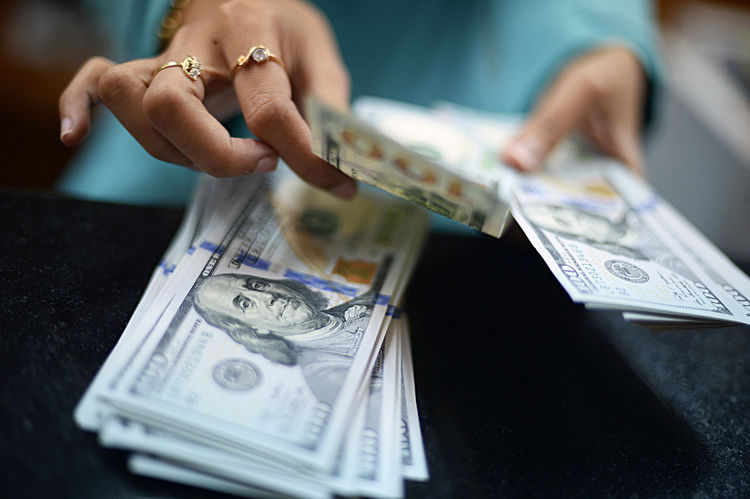- Banks Raise Dollar Spending by 900%
There is something to cheer for bank customers travelling abroad. Commercial banks have raised customers’ international dollar spending limit on overseas Point of Sale (PoS) and online card transactions by 900 per cent, it was learnt yesterday.
The policy shift is expected to help travellers pay their hotel bills, make reservations and other transactions using their debit cards.
The decision to increase the spending limit followed improved dollar liquidity in the market triggered by the Central Bank of Nigeria (CBN)-sustained interventions.
The interventions have yielded results and reduced foreign currency pressure on many lenders.
The CBN has pumped over $6 billion into key segments of the market in the last four months, an initiative that has strengthened the naira against the dollar.
Some of the funds have helped banks meet retail demand for Personal Travel Allowances (PTA), Business Travel Allowances (BTA), medical needs and school fees payment abroad.
Also, the Investors’ and Exporters’ FX introduced on April 24 to attract foreign investors and boost the supply of dollars has traded around $3.83 billion since it was established. It has also impacted on naira’s stability and improved dollar liquidity in the market, helping banks to review their dollar spending positions.
In a report to customers titled: Upward Review of the International Spending Limit on Your Naira MasterCard’ GTBank raised monthly dollar spending limit on naira MasterCard from $100 to $1,000 representing 900 per cent increase. The bank said: “We write to inform you of the monthly spending limits currently applicable when using your GTBank Naira MasterCard for International payments”.
The bank said customers could access the fund through Point of Sale (POS) and other online channels. The bank however, said international cash withdrawal was still restricted.
Many of the lenders, at the height of forex scarcity, pegged monthly transactions on PoS and online transactions using cards at $100, British Pounds Sterling 90, Euro 130 and Canadian Dollars 360.
Stanbic IBTC Bank, United Bank for Africa, Access Bank, Stanbic IBTC Bank, Standard Chartered Bank Nigeria (StanChart) and GTBank last October, announced the suspension of their overseas Automated Teller Machine card services. Also suspended by the banks were all foreign currency-denominated transactions, including those conducted on PoS machines and online.
The naira was then exchanging at N310 to the dollar in the official market and N450 to the dollar in the parallel market. The naira has since appreciated at both official and parallel markets. It was yesterday exchanging at N306 to dollar in the official market and N368 to the dollar in the parallel market.
During the dollar crisis era, many banks encouraged travellers to open dollar accounts, which have no spending limit. Such cards are issued by the banks on domiciliary accounts funded directly by customers.
Speaking on the new development, Head of Treasury at Ecobank Nigeria, Olakunle Ezun, said with improvement in the business environment, especially in the foreign exchange market, many commercial banks now enjoy improved dollar liquidity which prompted them to review spending limit on POS and online deals.
He said: “A lot of banks have improved liquidity. We’re returning to the pre-crisis era, when access to the dollar was not restricted. The CBN has settled a lot of outstanding dollar obligations which affected banks’ positions”.
According to Ezun, the banks were postponing settlement of dollar obligations during the crisis era, but those obligations are now cleared. ”There are no more outstanding obligations that will put pressure on banks’ dollar holdings. Those obligations are matured and fully settled by the CBN,” he said.
Confirming the rising dollar liquidity in the economy, Fitch Ratings said Nigerian banks’ ability to access dollar has improved considerably since the CBN introduced a foreign exchange “window” at end-April aimed at investors and exporters.
It admitted the Nigerian Autonomous Foreign Exchange Rate Fixing (NAFEX) mechanism, commonly referred to as the “Investors’ and Exporters’ FX Window”, is boosting foreign currency supply and the flow of dollar liquidity into the banking system.
It said improved access to dollar means that liquidity pressures have, for now, eased for Fitch-rated banks.


 Naira4 weeks ago
Naira4 weeks ago
 Naira4 weeks ago
Naira4 weeks ago
 Travel3 weeks ago
Travel3 weeks ago
 Jobs4 weeks ago
Jobs4 weeks ago
 Naira3 weeks ago
Naira3 weeks ago
 Naira3 weeks ago
Naira3 weeks ago
 Investment4 weeks ago
Investment4 weeks ago
 Travel4 weeks ago
Travel4 weeks ago



























